YASREF: A Rising Energy Star from Saudi Arabia
by Hu Yifeng
The Yanbu Aramco Sinopec Refining Company (YASREF), based in Saudi Arabia on the coast of the Red Sea, is among the world's leading refineries, with a daily capacity of 400,000 barrels of crude oil, the equivalent of an annual capacity of 20 million tons.
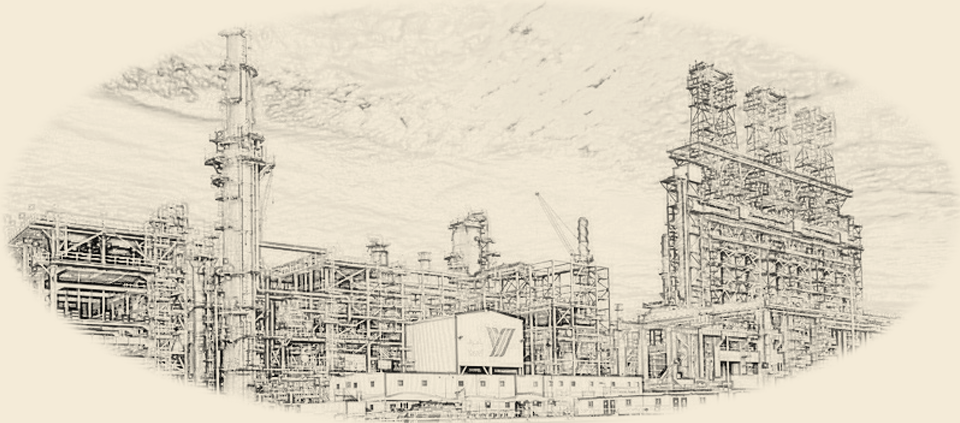
In 2015, this energy star from the desert won S&P Global Platts' Global Energy Awards, known as the Oscars of the energy industry, in the "Construction Project of the Year" category, pipping nearly 200 enterprises globally.
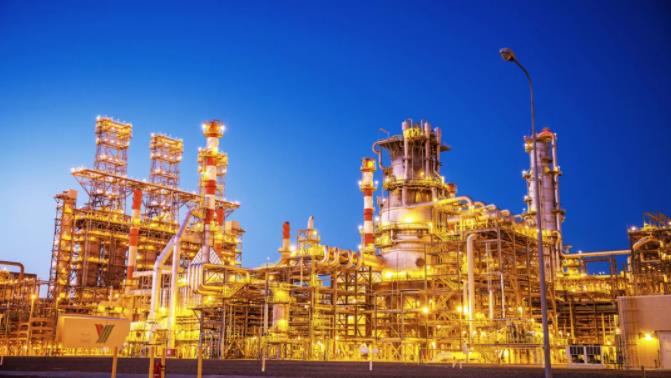
A night view of YASREF
YASREF: A Success in China-Saudi Arabia Energy Cooperation
YASREF is regarded as the fruit of an alliance between giants, being a joint venture of Saudi Aramco and China Petrochemical Corporation (Sinopec). Saudi Aramco, established in 1933, is the world's largest state-owned oil company, one of the largest crude oil producers, and an early collaborator with ExxonMobil, Royal Dutch Shell, Total and other oil giants. Sinopec is the world's largest refiner and third largest chemical company, and China's top supplier of refined oil products and petrochemicals. It has the world's second largest number of gas stations, and ranks second in the 2020 Fortune 500 List.
YASREF is located in the desert, where the temperature can rise as high as 50 degrees Celsius in summer. The Chinese staff, sent to facilitate the cooperation, had a hard time. Life meant only shuttling between home and work with no recreation. At work, they had no meeting room and had to use the canteen as a training venue. There were no barber shops and they had to give each other haircuts. They had no food purchasers and had to go grocery shopping in pairs during breaks. They really learned more life skills while living there.
They also faced the challenge of integrating different management philosophies.
Tao Hailin is in charge of financial analysis and consultancy at YASREF and his job is managing costs. His first task was to reduce costs. His Saudi colleagues professed not to understand cost control. But one of them, Aziz, told Tao that they knew wasting was bad yet most of them were unwilling to change things. Aziz also suggested that as an employee of the Chinese shareholder, Tao should introduce Sinopec's management philosophy and help create YASREF's own cost management model. It made Tao realize that the Saudi employees were fully aware of the problem of wasting resources but lacked the initiative to control costs.
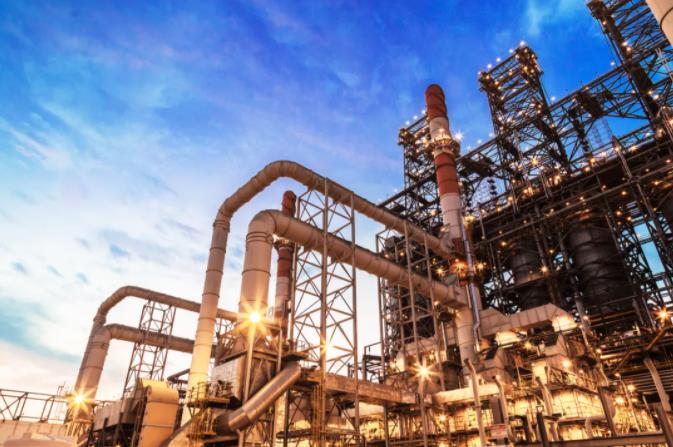
An outside view of YASREF
He did a detailed survey on the local employees, asking them targeted questions. He also consulted Sinopec's headquarters and its subsidiaries and obtained Sinopec's partial performance indicators to compare them with YASREF's.
The Saudi employees were astounded by the comparison results. The Chinese headquarters had a low loss ratio and a low per-unit refining cost. "How do they manage it?" Rayan, an employee from the accounts department, said in surprise. "We have so much to improve at YASREF." When the Saudi staff saw the gap, they began to follow cost control measures. Today YASREF has formed its own cost management strategy.
"We have been learning from our Saudi Arabian collaborator, and at the same time, promoting our effective measures to achieve win-win results. This is how I understand international cooperation," Tao said.
Under joint efforts, YASREF has won international acclaim for its advanced techniques, efficient construction, high-quality products and operation safety. In addition to the 2015 Global Energy Awards, it won the 2016 MEED Quality Awards for Projects, the top project award in the Gulf region, in the "Oil & Gas Project of the Year" and "Mega Project of the Year" categories. It corroborated YASREF's reputation as a rising star in the global energy sector.
Growing with YASREF
Yanbu, a port city in western Saudi Arabia, used to be economically underdeveloped. The locals mostly left their hometown to seek jobs in the industrial zone in the eastern part of the country. But when YASREF started trial operation in 2015, they began to return, finding there were jobs available back home.
Abdallah Al Subaiyyal, president of YASREF, has worked in China for more than eight years. A witness to the growth of YASREF, he is proud of the benefits the project has brought to Saudi Arabians. "YASREF plays a demonstration role in propelling industrial development, increasing non-oil income and creating jobs, as put forward in Saudi Vision 2030," he said, referring to the national strategy to reduce Saudi Arabia's dependence on oil and diversify its economy.
The local employees are the backbone of YASREF, and Khalid is one of them. From the IT department, Khalid has grown with the company, from engineer to manager of pipeline construction and system operation, and then head of IT services. "I have been promoted to higher positions, enhanced my capability, and received a higher salary," he said. "I am proud to work at YASREF."
YASREF's construction and operation projects have created over 6,000 jobs in Saudi Arabia. More than 800 local employees received training in the construction process. Hazime, who majored in chem-ical engineering from China University of Petroleum, speaks fluent Chinese. He feels lucky to work at YASREF where he can apply his expertise and speak Chinese with his Chinese colleagues.
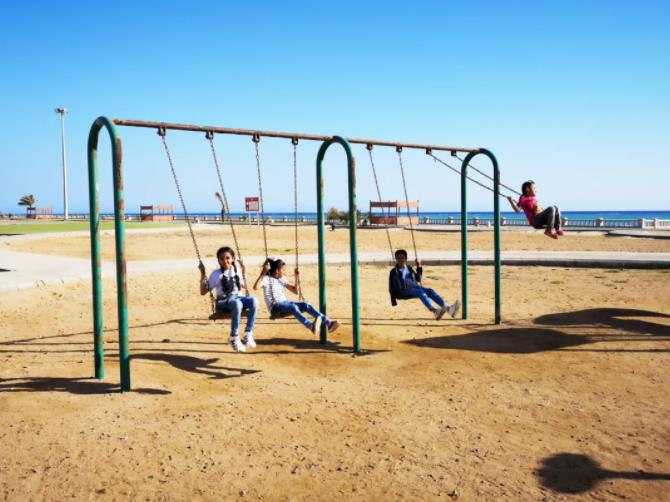
Children play on the beach in Yanbu.
The development of YASREF has improved local lives and enabled them to pursue their dreams.
The Camel and Panda Join Hands
China and Saudi Arabia have stepped up their energy cooperation. One out of every six barrels of crude oil imported by China comes from Saudi Arabia, while every Saudi riyal out of every 7 riyals of Saudi Arabia's export revenue comes from China. One Saudi riyal equals about USD0.27.
Effective economic cooperation is boosted by cultural exchange. Li Kunwen, an engineer with Sinopec, is an example of this. Li learned Arabic for two years before he was sent to work in YASREF in 2013, where he looks after quality supervision and inspection. At that time, he was the only Chinese employee there to speak three languages – Chinese, English and Arabic.
Due to his language proficiency, Li was assigned to train 16 local technical graduates in elemental analysis of metals and water. Two of them – Rida and Sarmi – were under his direct supervision.
"They worked hard and respected me," he said. "Through the training program, we had a better understanding of each other's working style and culture." The 800 new Saudi Arabian employees, including Rida and Sarmi, have completed their training and work independently today.
Li and his Chinese colleagues show due respect to the Saudi Arabian culture and customs. During Ramadan, the holy month of fasting, introspection and prayer for Muslims, the Chinese employees volunteer to take on more work. Public relations manager Hassam said the employees from the two countries are like brothers, helping and taking care of each other. YASREF represents not only commercial cooperation but cultural exchanges. In such a positive work environment, efficiency has improved.
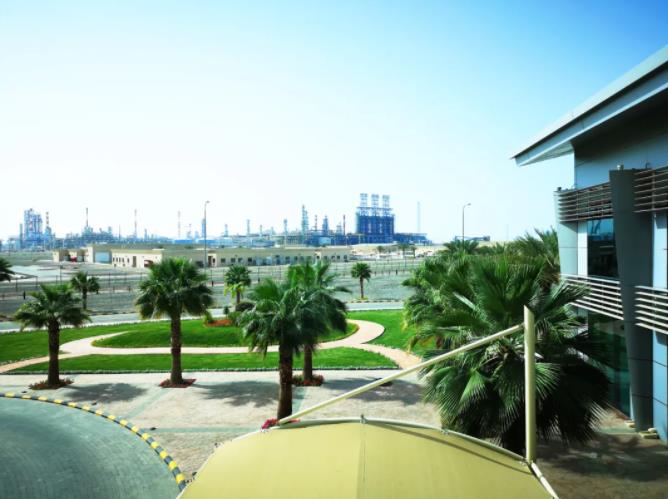
A distant view of YASREF
On his arrival at YASREF, Li asked the local employees what they knew about China. The chorus in answer was, "We know about the panda and kungfu." When they asked him what he knew about Saudi Arabia, Li's answer was similar, "The desert and the camel."
To promote cultural exchanges and people-to-people bond among its staff, YASREF organizes cultural and technological exchanges, and environmental protection and fire prevention activities. The company celebrates both Saudi Arabian and Chinese festivals, including Id al-Adha, Saudi and Chinese National Days and Chinese Spring Festival.
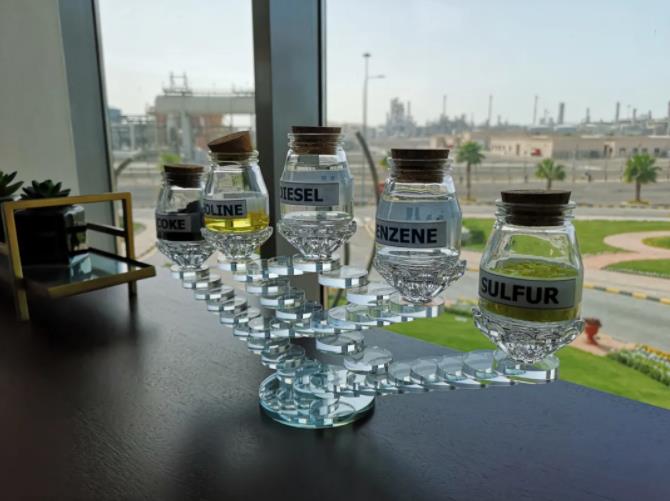
Some of YASRE's products
YASREF's most popular event is the Chinese Culture Day, with over 1,000 people taking part in it. Saudi employees are intrigued by China's history and culture, particularly Chinese calligraphy and the Peking Opera masks. They learn to write their names using Chinese calligraphy and sing Peking Opera songs. The Royal Commission for Jubail and Yanbu has asked YASREF to extend the activities to the residents of Yanbu so that they too can know more about China.
Economic cooperation paves the way for cultural exchanges, which in turn boosts confidence in economic cooperation. Li Xihong, head of Sinopec's Saudi Arabia office and general manager of YASREF, envisions that YASREF, a joint venture between China and Saudi Arabia and conforming to the development strategies of both countries, "will become a model for bilateral cooperation beyond energy."
YASREF is already a leading refinery globally, with the most advanced techniques, safest operation and the most efficient production. It is also a milestone in Saudi Arabia's industrial diversification. Erecting on the coast of the Red Sea, it tells a story about shared future between the panda and the camel.
FOR MORE
Project Overview:
The Yanbu Aramco Sinopec Refining Company (YASREF), a joint venture with a total investment of USD8.6 billion, went into formal operation on January 20, 2016. Sinopec owns 62.5 percent of its stakes and Saudi Aramco the remaining 37.5 percent.
YASREF's annual crude oil refining capacity is more than 20 million tons, an outstanding performance in the Middle East due to its advanced techniques, low costs, efficient construction, high-quality products and operation safety. In 2018, YASREF paid nearly USD57 million in taxes to the Saudi Arabian Government. Currently, it has some 1,100 Saudi Arabian employees, accounting for 86 percent of all employees, which is the highest proportion of local employment among local enterprises. YASREF has received various awards from the Saudi Arabian Government for several years in succession.


